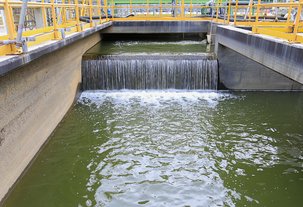The group of water researchers at Department of Biological and Chemical Enginering are focusing on advanced water treatment technologies in three main areas:
Value creation from wastewater
Make wastewater treatment plants into a value creation chain where resources are recovered and upcycled. Wastewater contains a lot of valuable sources of carbon and nutrients. Our research is looking at high-efficiency recovery of N and P fertilizers, extraction and use of microbiological carbon compounds and biopolymers as building blocks for new biomaterials and chemicals, and optimizations to turn sewage sludge into liquid and gaseous fuels for the green transition.
Water quality and health
Research in water quality to determine concentrations and effects of pollutants is of critical importance for the aquatic environment and human health. For drinking water purposes one of the concerns is per- and polyfluoroalkyl substances (PFAS) migrating to aquifers and surface waters. The understanding of transportation pathways and then concentration and degradation of these pollutants is of major challenge for our drinking water resources. In wastewater treatment plant outlets, the water quality plays a role in (eco)toxicological effects of micropollutants such as pharmaceutical residues on aquatic life and export of antimicrobial resistance genes to the environment. This determines the extent of treatment trains needed. In drinking water distribution and treatment, we are looking at how biofilm microbiome has an impact on water quality.
Growth markets for water technology
Water for industry and agriculture is a global challenge and advanced water cycle management is key to saving valuable freshwater resources. Further, the energy sector will be using increasing amounts of water, for example for power-2-X, and also coupling to other industrial processes will be needed. This is further connected to carbon capture, production of green fuels, minimizing N2O emissions from wastewater treatment plants and other actions to lower greenhouse gas emissions. These research ideas are further developed for redesigning wastewater treatment plants for use in new industrial settings as well as in low-income countries where wastewater is a huge challenge to handle.
Our researchers are working on the three themes above in their research and education of new engineers for the water industry. The water technology research group includes Professor Barth F. Smets and associate professors Thomas W. Seviour, Leendert Vergeynst and Zongsu Wei. Uffe Sognstrup Thomsen is supporting the group and leader of the interdisciplinary centre WATEC at Aarhus University. For more information about WATEC see watec.au.dk
Representative projects addressing these three themes include:
PFAS removal and destruction. The Water Engineering Innovation (WEI) Lab is developing a variety of effective and sustainable solutions to remove and degrade PFAS from the environmental media including water and soil. The specific projects include sustainable biochar modification, along with functional framework materials, for PFAS adsorption particularly those short-chain analogs. With respect to the destruction methods, we found photocatalysis, sonolysis, and electrolysis are good at defluorinating those forever chemicals. By applying sustainable principles, the WEI Lab is striving to meet the challenge of green transition in water and energy production.
Recovery of Extracellular Polymers from Wastewater Treatment Residuals as a New Circular Biopolymer (REThiNk) (see here for more details).
Integration of hydrothermal liquefaction (HTL), where detoxification of its process water is key to its successful implementation (see here for more details), as depicted below and with more information on HTL available here.
